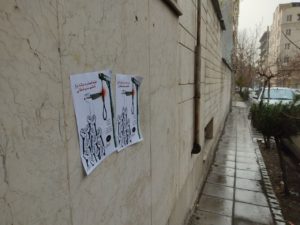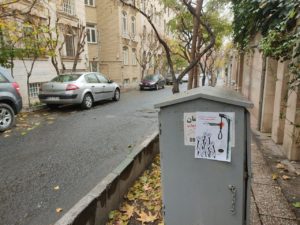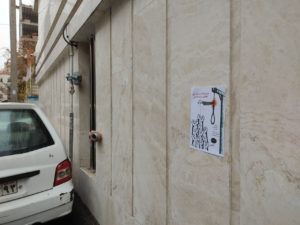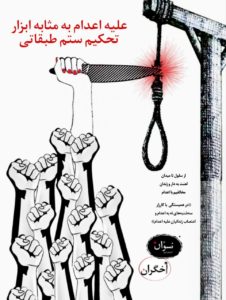With the expansion of political prisoners’ strikes during the “No to Execution Tuesdays” campaign—strikes that began in defense of the right to life for prisoners labeled as perpetrators of general crimes in Ghezel Hesar Prison and have now spread to several other prisons—the Akhgaran cell of the Women’s Secret Committee Against Execution took to the streets and posted flyers on the walls of alleys and streets. Alongside distributing and posting these flyers, comrades from the Akhgaran cell wrote a statement titled “Against Execution as a Tool for Reinforcing Class Oppression,” which states:
“What is happening in the Islamic Republic is a systematic form of ‘killing the poor’ through the apparatus of punishment and control, representing a government that cannot and will not stop the process of ‘impoverishment,’ instead resorting to the extermination of the poor.”
The full text of this statement is as follows:
The rate of executions in Iran has seen an unprecedented rise in recent years. This is not new information, as many global organizations and human rights bodies have repeatedly pointed this out. However, what is never acknowledged—and the real content of the intensification of executions is ultimately attributed to the evil nature of the Islamic Republic—is that the surge in executions in recent years is clearly based on class.
What is happening in the Islamic Republic is a systematic form of “killing the poor” through the apparatus of punishment and control. It acts on behalf of a government that cannot and will not halt the process of “impoverishment,” opting instead to annihilate the poor. Even regarding what is termed “political crimes,” while the issuance of death sentences has significantly increased, most of the executions that have actually been carried out involve individuals from impoverished, marginalized, and underprivileged segments of society.
Thus, in our view, the ongoing massacre of the poor in the prisons of the Islamic Republic—whether under political or non-political charges—is directly tied to the uprisings and protests of the downtrodden since the uprising of December 2017, as well as to the intensification of class oppression and contradictions resulting from the Islamic Republic’s governance.
A government that carries out executions fundamentally reveals the inhuman nature of its relations, showing that it cannot function without executions and cannot exist without sacrificing lives. In fact, execution is an inseparable part of the essence of a government that, if it ceased executions, would cease to exist, and to continue existing, it must execute. The highest level of oppression, physical elimination, is the reason for the survival of such a government.
However, sooner or later, executions lose their intimidating function. Sooner or later, it becomes clear that executions neither deter crimes—or what is labeled as “crimes”—nor can they silence all dissenting voices. The main and fundamental reason for the crimes to which the Islamic Republic responds with executions lies in poverty, marginalization, and social inequality. As long as oppression, exploitation, exclusion, and the subjugation of the underprivileged exist, such “crimes” will continue to occur, and there will always be those who cannot endure such conditions and take action or resist against them.
Therefore, executions only darken the social world of humanity and attempt to conceal the unresolved contradictions and conflicts of the existing order. For this reason, we believe that executions have a class character; they are a sentence against all the downtrodden and oppressed. Executions demonstrate that governments demand payment, a debt that must always be paid with the lives of the underprivileged, the exploited, and those who wish to be the voices of these underprivileged.
The government’s demand can be seen in laws written to protect the ruling class. Execution is something permanent and constant—only the necks change. Execution, ultimately, is the most brutal method of protecting capital, and just as capital turns living labor into dead labor, through the death sentence, it also turns living humans into corpses and the dead—whether on the gallows or under the burden of poverty, misery, hunger, and disease. Capitalism needs to take lives to sustain its disgraceful existence. Thus, the fight against the death penalty in connection with class struggle is not just a fight against a single “state institution” but also a fight against a system that, even if it abolished the death penalty in its judicial rulings, would still execute thousands of people daily in society to maintain its dominance.
Akhgaran Cell – Women’s Secret Committee
December 2024









Comment here